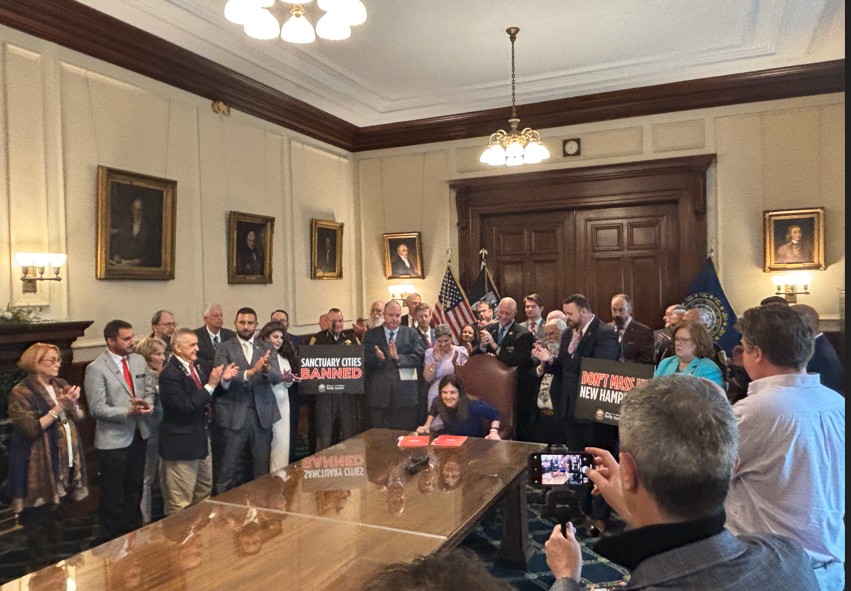By PAULA TRACY, InDepthNH,org
CONCORD – Saying she is fulfilling another campaign promise that makes New Hampshire safer, Gov. Kelly Ayotte signed bills to ban sanctuary cities and support cooperation between state and local law enforcement and federal immigration authorities Thursday.
Flanked by law enforcement and Republican legislators, the passage of House Bill 511 and Senate Bill 62 was celebrated as an effort that began in 2017 and failed in the House on multiple tries, they said.
But Ayotte said she heard from the public that this was a priority while campaigning and along with a recently passed bail reform measure, she counts these as political wins which help make this the safest state in the nation.
“I said from the beginning that we won’t let our state go the way of Massachusetts and their billion-dollar illegal immigrant crisis. Today, we’re delivering on our promise by banning sanctuary cities and supporting law enforcement cooperation with federal immigration authorities. New Hampshire will never be a sanctuary for criminals, and we will keep working every day to remain the safest state in the nation.”
State Rep. Joe Sweeney, R-Salem said, “We are sending a clear message to the state today that if you are in this nation illegally you are not welcome in the state of New Hampshire.”
He added “we are taking the handcuffs off our law enforcement officers and hopefully they will be able to work with our federal government and ICE to put the handcuffs on the criminal illegal aliens that are violating and disobeying our laws.”
He said it was a cooperative effort, though they did not have help from Democrats.
House Bill 511 banning sanctuary cities and towns passed 211-161 along party lines in the House and 15-8 in the Senate.
Senate Bill 62 relative to law enforcement participation in a federal immigration program and relative to cooperation with federal immigration authorities passed 15-8 in the Senate and 200-162 in the House.
At the House session last month that passed the ban, Rep. Chris Muns, D-Hampton, told colleagues he could no longer support House Bill 511 with the nation’s long-standing principles of “innocent until proven guilty, due process and free speech” all being violated as immigrants are being rounded up and deported.
He told of his father as a teenager grabbed off a street in the Netherlands by German soldiers and taken to a work camp in Germany during World War II. His parents decided to immigrate to the United States because they believed they would never be treated that way here, Muns said. “Nearly all of us are immigrants,” Muns said. “The only question is when and how our ancestors arrived.”
Sweeney said at Thursday’s news conference communities can call it what they want as some have called them “welcoming policies” that are banned by this law adding that over the years there have been as many as 12 communities which signed such “welcoming” policies.
State Sen. Bill Gannon, R-Sandown, who sponsored SB 62 said it was inspired by a 34-year-old woman from Ayotte’s own neighborhood in Nashua who was killed by an illegal alien.
He said Ayotte delivered on her promises and he will be back with more safety bills this session hoping to get bills passed with mandatory minimum sentencing, a breathalizer bill, and a bill regulating the use of out-of-state driver’s licenses issued to illegal aliens.
He noted the Republican controlled Senate has been behind these bills for five years and he thanked Republican House leadership that had this issue as a priority in helping deliver the bills into law.
Ayotte, a former prosecutor and the former New Hampshire attorney general, said what this means now is that all communities will have to follow this as the law and passing the bills is actually the safest thing for the state rather than having one policy in one community and another in another.
There is safety in uniformity in this matter, she said.
Other states have also passed similar measures including Texas and Tennessee.





